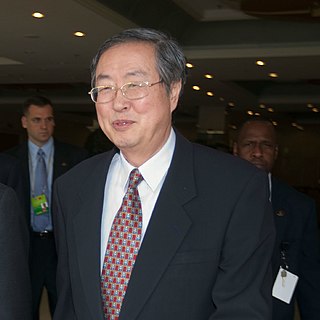
The International Monetary Fund (IMF) is a major financial agency of the United Nations,and an international financial institution funded by 190 member countries,with headquarters in Washington,D.C. It is regarded as the global lender of last resort to national governments,and a leading supporter of exchange-rate stability. Its stated mission is "working to foster global monetary cooperation,secure financial stability,facilitate international trade,promote high employment and sustainable economic growth,and reduce poverty around the world."

Since the island country's independence in 1966,the economy of Barbados has been transformed from a low-income economy dependent upon sugar production into a high-income economy based on tourism and the offshore sector. Barbados went into a deep recession in the 1990s after 3 years of steady decline brought on by fundamental macroeconomic imbalances. After a painful re-adjustment process,the economy began to grow again in 1993. Growth rates have averaged between 3%–5% since then. The country's three main economic drivers are:tourism,the international business sector,and foreign direct-investment. These are supported in part by Barbados operating as a service-driven economy and an international business centre.

A reserve currency is a foreign currency that is held in significant quantities by central banks or other monetary authorities as part of their foreign exchange reserves. The reserve currency can be used in international transactions,international investments and all aspects of the global economy. It is often considered a hard currency or safe-haven currency.

The global financial system is the worldwide framework of legal agreements,institutions,and both formal and informal economic action that together facilitate international flows of financial capital for purposes of investment and trade financing. Since emerging in the late 19th century during the first modern wave of economic globalization,its evolution is marked by the establishment of central banks,multilateral treaties,and intergovernmental organizations aimed at improving the transparency,regulation,and effectiveness of international markets. In the late 1800s,world migration and communication technology facilitated unprecedented growth in international trade and investment. At the onset of World War I,trade contracted as foreign exchange markets became paralyzed by money market illiquidity. Countries sought to defend against external shocks with protectionist policies and trade virtually halted by 1933,worsening the effects of the global Great Depression until a series of reciprocal trade agreements slowly reduced tariffs worldwide. Efforts to revamp the international monetary system after World War II improved exchange rate stability,fostering record growth in global finance.

The Bretton Woods system of monetary management established the rules for commercial relations among the United States,Canada,Western European countries,and Australia and other countries,a total of 44 countries after the 1944 Bretton Woods Agreement. The Bretton Woods system was the first example of a fully negotiated monetary order intended to govern monetary relations among independent states. The Bretton Woods system required countries to guarantee convertibility of their currencies into U.S. dollars to within 1% of fixed parity rates,with the dollar convertible to gold bullion for foreign governments and central banks at US$35 per troy ounce of fine gold. It also envisioned greater cooperation among countries in order to prevent future competitive devaluations,and thus established the International Monetary Fund (IMF) to monitor exchange rates and lend reserve currencies to nations with balance of payments deficits.

Marek Marian Belka is a Polish professor of economics and politician who has served as Prime Minister of Poland and Finance Minister of Poland in two governments. He is a former Director of the International Monetary Fund's (IMF) European Department and former Head of Narodowy Bank Polski. He has served as a Member of the European Parliament (MEP) since July 2019.

The Bank of Korea is the central bank of the Republic of Korea and issuer of South Korean won. It was established on 12 June 1950 in Seoul,South Korea.

Stanley Fischer is an Israeli-American economist who served as the 20th vice chair of the Federal Reserve from 2014 to 2017. Fischer previously served as the 8th governor of the Bank of Israel from 2005 to 2013. Born in Northern Rhodesia,he holds dual citizenship in Israel and the United States. He previously served as First Deputy Managing Director of the International Monetary Fund and as Chief Economist of the World Bank. On January 10,2014,President Barack Obama nominated Fischer to the position of Vice Chair of the Federal Reserve. He is a senior advisor at BlackRock. On September 6,2017,Stanley Fischer announced that he was resigning as Vice-Chair for personal reasons effective October 13,2017,two days before his 74th birthday.

Zhou Xiaochuan is a Chinese economist. Zhou served as the governor of the People's Bank of China from 2002 to 2018.

The Central Bank of Barbados (CBB) is the national monetary authority and central bank responsible for providing advice to the Government of Barbados on banking and other financial and monetary matters. The Central Bank of Barbados,was established by Act of parliament on 2 May 1972. Prior to the establishment of CBB,Barbados' monetary policies were governed through its membership in the Eastern Caribbean Currency Authority (ECCA). The Central Bank operates as the banknote issuing authority for Barbadian currency.

The Intergovernmental Group of Twenty-Four on International Monetary Affairs and Development,or The Group of 24 (G-24) was established in 1971 as a chapter of the Group of 77 in order to help coordinate the positions of developing countries on international monetary and development finance issues,as well as and to ensure that their interests are adequately represented in negotiations on international monetary matters. Though originally named after the number of founding Member States,it now has 28 Members. Although the G-24 officially has 28 member countries,any member of the G-77 can join discussions.
Sir Courtney Newlands McLaurin Blackman,KA was a Barbadian economist,international business consultant,and diplomat. He served as the first Governor of the Central Bank of Barbados from 1972 to 1987. At the time of his appointment,he was the youngest central bank governor in the world.

Agustín Guillermo Carstens Carstens is a Mexican economist who has served as the general manager of the Bank for International Settlements since 1 December 2017. He served as governor of the Bank of Mexico from 1 January 2010 to 30 November 2017. In 2011,Carstens,along with Christine Lagarde,was one of the two final candidates to become the managing director of the International Monetary Fund. He previously served as secretary of finance in the cabinet of Felipe Calderón (2006–09),as deputy managing director of the International Monetary Fund (2003–06) and as treasurer of the Bank of Mexico. In 2011 he was included in the 50 Most Influential ranking of Bloomberg Markets Magazine. Carstens took up his appointment as the general manager at the Bank for International Settlements in Basel,Switzerland,where he was appointed to a five-year term,starting on 1 December 2017.

Avinash D. Persaud is emeritus Professor of Gresham College in the UK. He was the Chairman of Intelligence Capital Ltd.,a company specializing in analyzing,managing and creating financial liquidity in investment projects and portfolios. He was also the non-Executive Chairman of the London-based Elara Capital,an investment bank. Persaud was a Non-resident Senior Fellow of the Peterson Institute of International Economics,Executive Fellow of London Business School and Senior Fellow with the Caribbean Policy Research Institute and Head of its Barbados office.

JoséDe Gregorio Rebeco is a Chilean economist,academic,researcher,consultant and politician. He has been the Governor of the Central Bank of Chile,Minister of the Economy,Mining and Energy during the administration of Ricardo Lagos and is currently the Dean of the School of Economics and Business of the Universidad de Chile. He is also a nonresident Senior Fellow at the Peterson Institute for International Economics.
Malcolm D. Knight is a Canadian economist,policymaker and banker. He is currently Visiting Professor of Finance at the London School of Economics and Political Science and a Distinguished Fellow at the Center for International Governance Innovation. From 2008 to 2012,Knight was Vice Chairman of Deutsche Bank Group where he was responsible for developing and coordinating the bank's global approach to issues in financial regulation,supervision,and financial stability. He served as general manager of the Bank for International Settlements from 2003 to 2008 and as Senior Deputy Governor of the Bank of Canada (1999-2003),after holding senior positions at the International Monetary Fund (1975-1999).
An international monetary system is a set of internationally agreed rules,conventions and supporting institutions that facilitate international trade,cross border investment and generally the reallocation of capital between states that have different currencies. It should provide means of payment acceptable to buyers and sellers of different nationalities,including deferred payment. To operate successfully,it needs to inspire confidence,to provide sufficient liquidity for fluctuating levels of trade,and to provide means by which global imbalances can be corrected. The system can grow organically as the collective result of numerous individual agreements between international economic factors spread over several decades. Alternatively,it can arise from a single architectural vision,as happened at Bretton Woods in 1944.

Carlos A. Végh is a Uruguayan academic economist who,since 2013,is the Fred H. Sanderson Professor of International Economics at the Johns Hopkins School of Advanced International Studies (SAIS),and holds a joint appointment with Johns Hopkins' Department of Economics. He is also a research associate at the National Bureau of Economic Research since 1998. He was the World Bank's chief economist for Latin America and the Caribbean from February 1,2017 to June 30,2019,while on leave from Johns Hopkins. He was previously a professor of economics and vice-chair of undergraduate studies at UCLA (1996-2005) and professor of economics at the University of Maryland (2005-2013). His research work on monetary and fiscal policy in emerging and developing countries has been highly influential in both academic and policy circles. In particular,his work on fiscal procyclicality in emerging markets has been instrumental in generating a copious literature on the subject,which has influenced the adoption of fiscal rules in many emerging markets.

Marion Vernese Williams GCM,is a Barbadian economist,banker,accountant and diplomat. She is a recipient of the Gold Crown of Merit.
Canada is one of the original members of the International Monetary Fund,having joined it on December 27,1945. It has a quota of 11,023.9 million SDRs and 11,698 votes,2.31% of the total IMF quota and votes,ranking the 9th of all. Canada has been represented on the IMF Board of Governors by Minister of Finance Chrystia Freeland since 2020. Canada elects an executive director on the fund's Executive Board with Antigua and Barbuda,Barbados,Ireland,Bahamas,Belize,Dominica,Grenada, Jamaica,St. Kitts and Nevis,St. Lucia,St. Vincent and the Grenadines. Philip John Jennings is the elected alternate director. Canada is the only G7 country that represents both lenders and borrowers at the IMF.
















